Stories, Observations and Commentary

Homer V. Wagnon, Jr.
EIB, CIB, BSM (2), PHM, GCM, WWII VM, EOM
American & European Campaigns w/3 battle stars
Rhineland, Ardennes, & Central Europe
S/Sgt. U.S.Army Infantry
Co."B", 407th Inf., 102nd Division
Ninth Army, European Theater
In early December 1944 my unit was fighting its way through the Siegfried Line in Germany. Our assignment was to attack towns and villages on our front to consolidate our position on the western edge of the Roer River. The German enemy stiffened his resistance to our entry into his homeland and he fought with renewed vigor and determination. My company’s last objective, in this operation, was the town of Roerdorf that was situated on the west bank of the Roer River. During the attack, the nearby explosion of an enemy mortar shell wounded me in the right leg.
I was evacuated along with other wounded men to the Battalion Aid Station where the Battalion Surgeon determined the proper care for each of us. In my case I was transported in an ambulance along with three other men to Liege Belgium and the 298th General Evacuation Hospital. Here we were well treated and our wounds attended to in the most satisfactory manner that was possible. Depending on how well we responded to treatment, and the severity of the wounds, the disposition of each man was made. Some went on to England, and some went from there to the United States, others stayed until well enough to return to the frontlines. I was one of the latter.
While I was recuperating in the hospital and responding very well to the treatment, the Germans decided to give us a "greeting" with V1 rockets.
Every three minutes a "buzz-bomb" would fall somewhere in the vicinity of Liege. Fortunately the hospitals were on the edge of town and only received one of these thousand pound bombs occasionally. But that was enough.
On the 16th of December, two weeks after my injury, the Germans broke through our lines and created the "Battle of the Bulge". They were headed for Liege, and the rockets were meant to soften the target. Soon a call came for all "walking wounded" to put on their uniforms and fall out. That order included me. Men from all the hospitals who were able, and men from service units in the city, were organized into appropriate fighting units and sent to the outskirts of the city to form a defense against the oncoming German attack. We dug in our foxholes and prepared for the onslaught.
The attack against Liege never came. The German army was stopped by the men in and around Bastogne Belgium in an heroic stand against a massive force of men and machines. We were saved to fight another day. On December 27th, my 21st birthday, I was returned to the frontlines.
This was an incident in my WWII war experience that I thought might be interesting because it was unique and although fraught with dire possibilities ended up in retrospect as a comparatively pleasant "vacation" from combat in the frontlines. After this one chapter in the hospital, I continued to serve in infantry combat until the end of the war without another scratch, but with many close encounters. The hospital was clean and warm and we had great food to eat. To be in the company of the doctors and nurses was a virtual blessing compared to the frontline experience with dirty foxholes, unsanitary cellars, freezing cold weather, poor food and constant physical and mental exhaustion. It was almost worth being a casualty to spend the time in their care.
I know the soldiers in the "Gulf War" are having different conditions, but I'm sure they share in the frustration I felt in my war. Still, we must persist in this effort as we did in the "Greatest Generation", because the alternative is unacceptable.
Joe Richard's stories from our fellow WW Two vets.